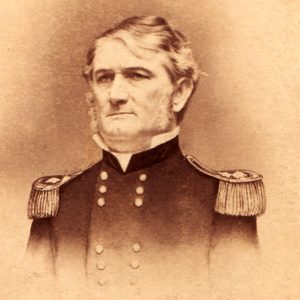calsfoundation@cals.org
Leonidas Polk (1806–1864)
Leonidas Polk was the first bishop in the Episcopal ministry to serve Arkansas, and he also served as a Confederate general during the Civil War. In addition, he was the second cousin of President James K. Polk and helped found the University of the South in Sewanee, Tennessee.
Leonidas Polk was born on April 10, 1806, in Raleigh, North Carolina, to William Polk, who served as an officer in the American Revolution and was a well-to-do planter in North Carolina, and Sarah Hawkins Polk; he had three brothers. Polk first attended the University of North Carolina at Chapel Hill from 1821 to 1823 but did not take a degree. In 1823, he received an appointment to the United States Military Academy at West Point through the connections of his father.
While at the academy, he became friends with fellow cadet Jefferson Davis. He was baptized by the academy chaplain in 1825. Polk graduated eighth in his class on June 30, 1827, and almost immediately left the army, as many cadets of the day did. After helping his father and brother run their plantations for about a year, he began studying Hebrew in New York City in October 1828. In November 1828, Polk entered the Virginia Theological Seminary in Alexandria. He was ordained on May 22, 1830, and married Frances Ann Devereux on May 6 of that year. Their first child was born on January 27, 1831, and Polk soon left his young family for a year abroad in Europe. They went on to have a total of ten children, eight of whom survived infancy.
Upon returning to North Carolina, Polk did not seek a religious position but instead continued to work as a planter. In 1833, Polk and his family moved to Maury County, Tennessee. While building his plantations in Tennessee, Polk volunteered with the local Episcopal church and became well known to Episcopalians throughout the state. Thus, he was chosen as a delegate for the General Convention of the Episcopal Church, representing the Diocese of Tennessee.
It was at this convention in 1835 that two new bishop positions were created for missionary purposes in the lands west of the Mississippi. The position covering the northwest was quickly filled, but the position of missionary bishop of the southwest was not filled until the convention of 1838. Polk, who was not in attendance that year, received the position. He was consecrated at Christ Church in Cincinnati, Ohio, on December 9, 1838.
Polk set out in early 1839 to learn about his new position. After visiting Mississippi and Memphis, Tennessee, Polk traveled up the Arkansas River to Little Rock (Pulaski County), arriving on March 7. Polk solicited donations from the Episcopal families in the city to pay for the assignment of a minister to the area. He then traveled to Washington (Hempstead County) and preached two sermons. He continued his journey to the Red River and boarded a boat to Shreveport, Louisiana. Polk visited churches throughout Louisiana and Mississippi before traveling to the Republic of Texas.
Polk set out to expand the influence of the Episcopal Church throughout the southwest by building new churches and dispatching young ministers to the area. He set out to increase the amount of funds that were allocated to the southwest.
At the General Convention in 1841, Polk was appointed as the bishop of the Diocese of Louisiana. With this new position, Polk no longer traveled throughout the southwest but rather served in just Louisiana. Over the next thirteen years, Polk increased the number of Episcopal parishes in Louisiana from four to thirty-two and twenty-three congregations of slaves.
At the outbreak of the Civil War, Polk joined the Confederate army and was appointed to the rank of major general on June 25, 1861. He was promoted to the rank of lieutenant general on October 10, 1862.
At the beginning of the war, Polk commanded the Department No. 2, which encompassed part of the territory that he still led as the bishop of the southwest. He led a corps at the battles of Shiloh, Perryville, Murfreesboro, Chickamauga, and in the Atlanta Campaign. From 1863 to 1864, Polk also served as the chancellor of the University of the South. He was killed at Kennesaw Mountain, near Marietta, Georgia, by a cannon shot to the chest on June 14, 1864. His body was buried at Augusta, Georgia. It was later moved to Christ Church Cathedral in New Orleans in 1945.
Although Polk spent little time actually traveling and preaching in Arkansas, he was instrumental in establishing the present Episcopal Church in the state through his fundraising and leadership abilities while he served as the missionary bishop of the southwest.
For additional information:
Horn, Huston. Leonidas Polk: Warrior Bishop of the Confederacy. Lawrence: University Press of Kansas, 2019.
Parks, Joseph Howard. General Leonidas Polk, C.S.A. The Fighting Bishop. Baton Rouge: Louisiana State University Press, 1962.
Warner, Ezra J. Generals in Gray: Lives of the Confederate Commanders. Baton Rouge: Louisiana State University Press, 1959.
David Sesser
Nevada County Depot and Museum
 Leonidas Polk
Leonidas Polk 



Comments
No comments on this entry yet.